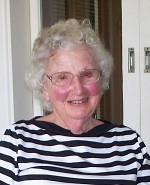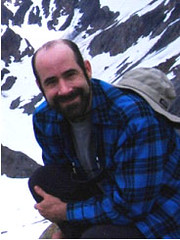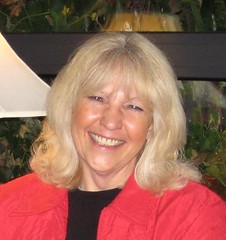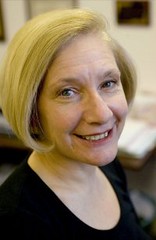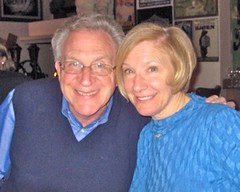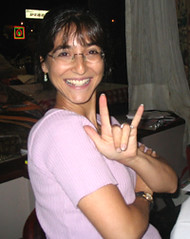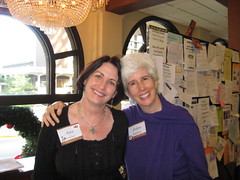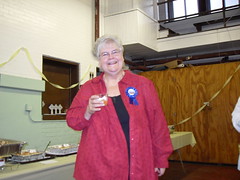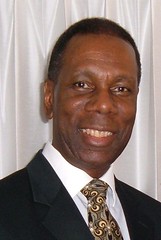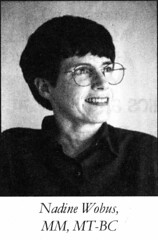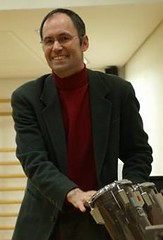Memories from the IX World Congress of Music Therapy
Memories from Ruth Bright
The visit to the USA for the World Congress in Washington, DC, was particularly interesting because my husband, Desmond, was with me, going to several universities and museums while working on his PhD Thesis on Egyptology (which he completed and graduated a few years ago—at the age of 81!) He went to New York while I was at the congress.There was a seminar (Institute: Music Therapy and Gerontology: An International Forum for Informing and Sharing) before the congress, and I was involved in teaching for that event.
The range of papers at the Congress itself was interesting – and, as always, it was often difficult to decide which of the parallel sessions to attend!
My own paper was on the topic of looking back years of being involved in music therapy for many different populations. It was titled "Looking Back over 40 years of Music Therapy: The Therapeutic Alliance in Supportive & Eclectic Music Therapy" and is available here. The theme was my eclectic approach, that different people need different approaches in music therapy to help them to get through the barriers which come between them and health.
I think that the Washington congress was the occasion at which there was a meeting about the re-joining of the two USA music therapy associations, run by Ken Bruscia, with much interaction at the meeting when the matter was discussed.
(I recall disappointment that the initials AMTA had been chosen, which we felt had 'belonged' to the Australian association ever since 1975!)
I recall seeing the congress as a whole as being very useful to practising MTs—not all conferences achieve this, some are so theoretical that they offer little or no practical help—and I also recall being very aware of the differences between the practice methods, and even the philosophy, of music therapy in different countries. Not that this was unique to the 1999 congress, of course.
Memories from Debbie Carroll

Other memories that are etched in my mind:
- Tony Wigram’s workshop on structured and free improvisation in group music therapy. The room was overflowing and people were standing in the doorway. Tony’s passion and musicianship were contagious. This workshop was one of several he was giving during the years leading up to the publication of his outstanding book on Improvisation, which became an invaluable source of musical and clinical ideas for the entire music therapy community, including myself and my students. Tony will be dearly missed.
- Attending the many enlightening panels on the practice of music therapy from the perspective of the five international models of music therapy, among other excellent presentations.
- Drum circle led by Arthur Hull and Christine Stevens – this was my first experience participating in a MEGA drum circle, and I was blown away by the feeling of being as one with hundreds of people!
- Getting lost all too often in the labyrinth of the construction taking place at the Omni Shoreham Hotel where the Congress was being held.
- Sweet Honey in the Rock – the a cappella group whose harmonies, spirit and synergy were intoxicating!
- Reconnecting with classmates from the Guildhall training course, including Helen Odell-Miller, and meeting many music therapists whose articles and books I had read.
Memories from Jim Couture
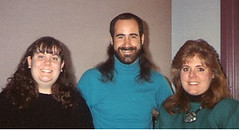
Memories from Cheryl Dileo
At the World Congress in Washington, D.C. in 1999, Dr. Joe Scartelli of Radford University received the Award of Merit from the American Music Therapy Association. Dr. Karl Pribram and his partner, Katherine Neville, came to the conference to see him receive this award. After the conference, Karl and Katherine took Joe and myself to dinner and to their Georgetown apartment for drinks. It was a very special time with wonderful friends.Memories from Suzanne Hanser
Looking back, I realize the importance of this trip as a turning point in my life. First of all, the panel on qualitative research on which I served challenged me to question my decisions as a researcher. Alongside distinguished researchers from all over the world whose work I greatly respected, I placed my research experience into the context of qualitative perspectives, even though most of my work was clearly considered quantitative. The preparation and ensuing dialogue allowed me to articulate the evolution of my research agenda, my resistance to view any worthwhile and holistic efforts to answer a question or solve a problem as either quantitative or qualitative, and my commitment to consider mixed models in future research endeavors.Also at the congress, I presided at a session on “Music Therapy and Stress Management: Personal and Professional Applications” with Susan Mandel and Diane Snyder-Cowen. Remarkably, now a dozen years later, I have just co-authored a book and CD, entitled "Manage Your Stress and Pain through Music" with Susan, who is now Dr. Mandel.
At the conclusion of the congress, I was delighted to invite a man whom I was seeing, Alan Teperow, to join me in my first home, New York City, and later that week, we were treated to an exquisite Thanksgiving dinner at the home of Barbara Wheeler. There, I received sanction from Barbara and her wonderful guests, music therapists from around the world, to pursue the relationship. On December 31st, on the verge of the millennium, Alan proposed, and we have now been happily married for 11 years.
I may have had an inkling at the congress that a new husband was in my future, but I would not have predicted that I would continue to explore common interests and end up collaborating on a book and CD on stress and pain. So this congress was to forge and cement future meaningful relationships at both personal and professional levels.
A picture of Alan and me - the happy couple (after our wedding) - is provided.
Memories from Lora Heller
I have some very clear memories of the World Congress in Washington, DC in 1999, and others that are quite vague—I had mushy mommy brain as I’m sure many of you will understand as you read on.In May of ’99, I had just become a mom for the first time. As a nursing mom, I could not leave my 6 month old home for the long weekend while I attended a conference, but my husband had work commitments and couldn’t come along (the congress began on a Wed or Thu). So baby Zeke and I rode the train from NYC to DC, where my mother met us and stayed with us during the conference.
The hotel/conference center was beautiful and we were upgraded to a larger room with a sitting area, two big beds and a crib - the three of us had a very comfortable place to stay for the 3 or so nights. Zeke had very special, intimate time with Nana, and even got to meet his cousin from Maryland for the first time (age 9 months) who came by the hotel with my step-sister to visit.
My presentation was titled Music Therapy to Foster Language & Communication Skills in Deaf Children. It was based in part on my master’s thesis which led to the development of Baby Fingers. It was exciting to be surrounded by music therapists from around the world! There was so much conversation about American Sign Language, bilingualism, and sign languages from other cultures. There were also questions about how Deaf children can enjoy music. My son had just begun signing, and while he is a hearing child, when he did stop in with my mom he provided a wonderful demonstration of the benefits of sign language in early language development—especially when accompanied by songs!
We had two baby-related issues that weekend. The first was when my mom couldn’t reach me because my cell phone was turned off (I was in someone else’s presentation at the time). Zeke was so hungry but wouldn’t take the bottle she offered him and was not interested in the food available. When we finally did meet up, Zeke nursed like there was no tomorrow, but only after crying with Nana for a while—they were both totally exhausted. I guess all three of us were! The second was when the wheel on our stroller broke. Travelling alone with a baby, I had kept my things to a minimum. The stroller was a well-worn but reliable hand-me-down car seat/stroller. The wheels and handle folded in and popped out when needed. Well, it was much harder to get around with only 3 wheels! I was using a baby carrier at the time as well, but Zeke really liked sitting on his own able to look out and reach out.
Anyway, I still have my folder of handouts and notes from sessions I attended, contact information I gathered, and music therapy materials shared. It was a good working mom experience and a successful weekend overall.
Memories from Carolyn Kenny
I have very special memories from this congress.A meeting with members of the World Federation, the AAMT International Newsletter, Brynjulf Stige, and myself marked the initiation of Voices: A World Forum for Music Therapy. As the Editor of the International Newsletter, Lisa Summer was a very important participant in this meeting. I think there were about 10 people in attendance. We sat in a circle and had a great discussion. There was a lot of excitement in the air around the possibility of a new International publication. Voices was born at this meeting!
Ken Aigen, one of the conference organizers had asked me to offer a plenary session for the conference. So I prepared “The Sense of Art: A Rainforest of Strength”. My goal was to create a performance piece for the conference that integrated recorded music, beautiful images from nature, spoken text, and live music. Alain Lauzon had made a wonderful flute for me. So we began the presentation from silence with dimmed light, Alain and I playing our flutes across the auditorium, responding and improvising with each other amidst glorious echoes in the space. The resonance was awesome! As I read my speech, we saw a covey of Blackbirds circling overhead at the top of the auditorium. Of course, afterwards, we spoke of how they were attracted to the music and images of nature! At the end of my presentation, members of the audience participated in a free improvisational with bird whistles, small percussion instruments and voices. This presentation and experience was one of the most wonderful moments of my career in Music Therapy. I felt that it was integrative and whole, embodying the diverse elements of what I had to bring to the occasion and also embodying a sense of community that echoed the theme of the congress – Many Voices, One Song. You can read the text from this presentation in Music and Life in the Field of Play: An Anthology (Barcelona Publishers, 2006).
During the conference I was having a lot of physical problems with serious rashes and could not participate in most of the sessions. However, Dr. Karen Reed and her daughter watched over me in my hotel room, bringing me food, and keeping me company so I would not be alone. That was also quite special.
Memories from David Knott
In 1999, I had just completed my undergraduate training in music therapy at Willamette University. The prospect of attending an international conference seemed exciting and since my grandparents lived not far from Washington DC, it was not only more feasible, it meant I could visit with them as well.I attended the poster session and encountered Barbara Dunn, where she was presenting on her work with people living with HIV at the Bailey-Boushay House. When I returned to Seattle, I did my internship with Barbara and began my professional journey in music therapy.
I've come to experience conferences as opportunities for learning, inspiration and getting to know other music therapists. But this conference, my first, really impressed on me the transnational scope of music therapy. I had read Ruud, Amir and Wigram and other international authors and knew about music therapy in other countries, but being there with music therapists from so many different places made me feel connected by a shared purpose that transcended countries and nationalities.
Memories from Anne Lipe
Louise Lynch, MA, MT-BC and I served as the co-chairs of the local committee. We were contacted by AMTA National Office staff in early summer and worked closely with them in gathering local music therapists and students to assist with local host duties. Everyone was quite enthusiastic about the conference, and eagerly pitched in to help. Donna Washington, MCAT MT-BC, Director of the Music Therapy program at Howard University, headed the Registration Committee, and she and her students welcomed attendees and provided directions to the meeting rooms. The young professionals and students who served on the Instrument Committee were extremely well-organized and developed an efficient system for schlepping instruments from session to session. Megan Knepper, MT-BC co-chaired the committee, and I’m still trying to track down the names of those who worked with her. One special memory I have is of Lorin Hollander hanging out in the instrument room playing the piano and telling the workers what a great job they were doing. Everyone greatly appreciated his presence and his words of encouragement. A prominent memory I have about the Instrument Committee is that at the close of the conference when we were checking to make sure that all of the instruments had been accounted for, one maraca was missing. We were very proud of that, and think that must be some kind of a record for a world congress! The strongest memory that Louise and I both have is of the great camaraderie that we all had; we agree that we had a fabulous team - which made our job a piece of cake.Memories from Terra Merrill, Susan Summers, and Alpha Woodward
Introduction:

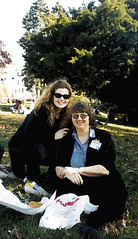
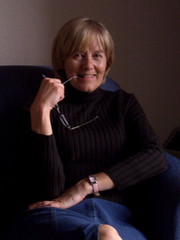
Terra: When I reflect on that congress it goes all the way back to the process we undertook to create the proposal. Fresh from completing our Master’s Degrees, Alpha, Susan and I were keen to present our research and wanted to do so in a way that would represent our deeply-held community connections forged through our graduate education, and indeed reflect our social context as Canadians. We had been in the same cohort for our degrees and had also been co-members (and co-authors) in a peer supervision group. I believe that I was very enthusiastic about presenting as representatives of our music therapy community from Vancouver, B.C.
I remember that we met in coffee shops to work up our proposal. I also remember that we did not use the internet much in those days, we mailed paper copies of our proposal and called one another on the telephone or met in coffee shops to take care of business.
Alpha’s work focused on the role of the sound environment within institutions and with older adults; Susan’s thesis involved a model of practice that explored creating community within long term care settings through the creation of a Choir; and I presented on my research using Free-Improvisation (informed by Creative Music Therapy) with persons with end-state Dementia and the resultant model for consciousness that was the outcome of that study. It was a real challenge to decide what to include and what to eliminate from that presentation.
Alpha: That is what I remember of my process for preparing for this Congress – the arduous unwrapping of 3 years of research and study – into a fifteen-minute paper presentation. We listened carefully to each other and provided invaluable critical feedback along the way. For me it was imperative that my work – an ecological treatment model that considers the sound environment as both an ally and client in institutionalized care facilities – was heard in the larger music therapy community. And that passion was matched by both Terra and Susan’s commitment to their work and vision.
Terra: The theme of the congress was diversity/ multiculturalism, and I remember that we worked with that topic extensively, exploring the diversity that existed at the time in practice within the same clinical population- Older Adults.
Alpha: Many of Terra’s memories are also mine – and the sharing of the work that vitalized each of us, and our big adventure to Washington, D.C. is a gift to recapture 12 years later. Mostly I feel that the Washington Congress was the culmination of our 3 years of studying together in the Masters group, and the deep work we had collectively explored in our peer consultation group. The chance to present at this Congress felt like being a debutante at a coming out party – a kind of launching pad for our research achievements and Masters status. I remember it was Terra who thought of how to fit our work into the theme of the Congress, and who chose suggested the title for our presentation.
Susan: The main event for me in the Congress was our presentation. As both Terra and Alpha have mentioned, we’d worked for months on our presentation and were thrilled to be accepted! I was very nervous presenting at a World Congress for the first time but knew I was with three amazing women and knew that we were ready. It was a special treat to have our inspirational mentor and friend, Carolyn Kenny, moderate the presentation, and to have Helen Bonny be with us.
Alpha: One of the many things I had learned to appreciate under Carolyn Kenny’s mentorship, was the honoring of diversity and the value of paradox. We listened carefully to each other and provided invaluable critical feedback along the way.
Terra: I was so pleased that Carolyn Kenny agreed to be our moderator- she is a significant figure in each of our lives, individually and collectively, as she was the chair of all of our research committees and a Mentor to us all as individuals and as a group. She really encouraged us to present our work, but also to keep grounded and NOT be star-struck. We met several times to develop our proposal and because I was the contact person, I was thrilled to receive our acceptance letter.
Alpha: It was an honor just to be a colleague on this team – and a thrill to receive that acceptance letter!
Terra: I really felt as though we were stepping out onto the world stage as individuals, but moreso as a diverse and exciting clinical community.
Susan: I felt the same, Terra. Washington was my first Music Therapy World Congress. What I remember most about the World Congress in 1999 was the unbelievable number of music therapists (2500) who were in attendance. Because I stayed at the hotel, everyone I met along the hallways, and in the elevators, was a music therapist! Coming from a country with a few hundred music therapists spread across thousands of miles, this was thrilling! I remember going to poster presentations for the first time and seeing music therapists from all over the world present and talk in language and models that I not only understood, but that I used daily. This gave me increased confidence and a feeling that I belonged to a larger collective and community.
Terra: I agree, Susan. Arriving in DC was pretty incredible. I had never seen so many music therapists in one place at the same time, and I marveled that there could be so many of us in the world. Coming from Vancouver, I really did feel a bit star-struck. We were such a community unto ourselves. The first real sense of connection to the greater world of music therapy came to us through Carolyn Kenny and our amazing Master Degree curriculum, where we had a chance to study with very prominent music therapy clinicians and researchers. Coming to world congress served to enhance this sense of being a part of something BIG.
I attended a reception for Helen Bonny and it was wonderful to be with all of my Guided Imagery and Music colleagues. I had connected with Helen prior to that and shared with her how her model of music and consciousness had influenced my own research and she promised to attend our presentation. I was delighted when the time came and she walked into the hall. It meant a lot to me that she did that. We were given a great time and venue. We felt very welcomed.
Alpha: It was like being at the Oscars for me – to meet some of the ‘greats’ in music therapy: Brynulf Stige and Kimmo Lehtonen, for instance, but there were many others. I remember there were five music therapy approaches announced at this congress – with Helen Bonny’s method of Guided Imagery and music being the latest to be added to music therapy frameworks. And like Terra and Susan, I waited in anticipation to see if Helen would come to our session.
Terra’s work had a lot of Bonny in it – especially around her exploration of consciousness. Mine did too – but in completely different ways. My thesis was developed upon a dream - the significance of which was simultaneously unwrapped through hermeneutic cycles of interpretation and discovery. My training in GIM was fundamental in my use of music in the environment. And then Terra was at a reception held in Helen’s honour. I recall observing Terra in her element and in a state of grace – glowing from the inside out. It was hard not to glow in a room full of GIM practitioners!
Susan: Because so many music therapists in British Columbia work with older adults, I participated in the pre-conference workshop. What I took away was pride in our own Canadian training and the expertise that Canadian music therapists offer our older adults in care. I met and heard presentations from so many other music therapists whom I had studied in our masters program, or through reading their books and articles – it felt like coming home.
Terra: I agree, Susan. I remember attending the roundtable for individuals working with older adults, listening to their many dilemmas and struggles, and sharing my own experiences as well. Someone said something to me that I have never forgotten: “We could NEVER do what you are able to do here in the US. In the US, music is viewed as entertainment; in Canada, it is viewed as art- it’s a big difference.” Now, having worked equal numbers of years in both countries, I have to agree.
Alpha: Like Susan and Terra, I had never been (before or since) with so many music therapists in one place – not even at other World Congresses. It was almost overwhelming.
On Susan and Terra’s point, one participant from Canada came by after our session to say that she had been to two other presentations I gave at National Conferences, so considering that it was a repeat, it was amazing that she chose to attend our session. We don’t always know where our work goes after we present it, so for me it was a source of pride to learn that OUR work was followed; that we really were seen and heard amongst the milieu of fabulous presenters and mentors that I held in the highest regard.
Various Vignettes
Susan: I remember Terra’s presentation about her master’s research using Nordoff Robbins method with older adults with dementia, and feeling so proud of she and Nadine Cadesky, who had participated in this important cutting-edge research. I remember drumming in the biggest indoor drum circle I’d ever seen, with hundreds of music therapists! I remember Carolyn Kenny’s presentation, and hearing Lisa Sokolov and Diane Austin speak about the use of voice in their clinical work, and being inspired to pursue vocal psychotherapy training with Diane, which is now a reality in Vancouver.
Alpha: Of Terra, I remember the anticipation of sitting on the plane waiting for take-off, and her quietly saying – “with so many angels flying with me today, I feel safe.” The Congress was the beginning of many years of travel for me, and now I make a blessing for the richness of my work that takes me to interesting places, and the angels that travel with me. How excited we were to be on this adventure. Terra and I shared a room at the hotel and I recall the confusion of renovations under way. I vividly recall our tour of the capital – and especially the war memorial wall with thousands of names engraved upon it. As a Canadian I had not experienced our participation in a war in my lifetime. We visited one part of the Smithsonian Institute and eventually came to the steps where Martin Luther King Jr. made his famous speech. I remember the temperature that November day – a cool 47 degrees and a slight wind. Many trees still had their leaves – sensory memories before a migraine wiped out the next 36 hours.
Terra: I too remember the day that Alpha and I slipped away to do a bit of sightseeing in the afternoon. We hopped on the underground and went to the Mall, the Smithsonian, the Lincoln Memorial, and the Vietnam memorial. These are all special sights to me as I was born in the US but had never been to the capital. The Vietnam war had tremendous impact on my family as my elder brother served the US in that conflict. I spent some time at that memorial, trying for the best photo I could get to give to my brother as a gift to honor his service.
Alpha remembers her crisis: Shortly after arriving in Washington, I was bedridden with a terrible migraine headache. I recognized at the onset, that the migraine was born from my intense excitement and focus on the presentation, but it had an unrelenting grip that worsened by the hour. There was nothing I could do but lie completely still in a darkened room. Terra applied Reiki, but it just got worse. But after 36 hours, with no sign of respite, there was a sudden change. One hour before we were to present, Susan tip-toed into the dark room and gently offered to read my paper if I could not make it. Thirty minutes later, my head cleared completely. With five minutes to spare and still pale, weak and wan, I shuffled onto the stage – and to the complete surprise of Terra, Susan and Carolyn - delivered my paper in full voice. This miracle was the feature I remember the most – and the support and willingness of my friends and co-presenters to support my work if I could not do it myself. Carolyn bracketed my performance like that of a sleeping unconscious body in a dark and smoky blues bar’ – eventually awakening in the haze at the right moment to play the most dazzling music. I like to think of my best writing as music, and that was the most interesting compliment I have ever had.
Susan: I, too, remember Alpha’s migraine. As we had worked as a team for months to prepare for the presentation, we now worked as a healing team to help Alpha be well enough to present in person. With a combo elixir of Terra’s Reiki and my energetic and essential oil healings, coupled with Alpha’s determination, she was invincible. The presentation went well and I remember us having some fellow Canadians there, which felt very special. This was a milestone in my career.
Terra: Alpha’s recovery just in time to give her presentation was a dramatic moment. She was indeed terribly pale, but she really exerted herself and gave a compelling presentation. Moreover, she responded to questions cogently. Alpha has a way of really delivering in the crunch. That was, I think, my first experience of that quality of hers. I remember that Carolyn was also quite unwell and stayed in her room quite a bit. I think that it was the first time I experienced crowd-overstimulation. I had difficulty staying in the drumming room, and the very large presentations. I sought fresh air a lot and took a lot of walks out of doors.
Alpha: I did order the tape of our presentation, but I am not certain if we ever got any feedback. If there was feedback, I would like to see if anything we offered made sense. It feels important to me now to reconnect with the threads that we put out to the community. Where have they gone, and what tapestries have we helped to weave?
About each other…
Alpha: Working with Terra and Susan - two very gifted, insightful and motivated music therapists, both of whom were in my peer consultation group, as well as co-presenters on this panel - was an exciting period of professional growth for me. And that passion was matched by both Terra and Susan’s commitment to their work and vision. It was an honor just to be a colleague on this team – and a thrill to receive that acceptance letter!
Susan was the epitome of confidence and competence in her work, her musicianship and her organizational abilities. Having her perspective and her particular approach to community building through voice in institutional care facilities rounded out our diverse approaches and offered a rich potpourri for our participants. Susan’s work offers a welcome approach with tangible and concrete techniques, and for this and many other reasons I am always happy when Susan is on board. She brings a quality of clarity and certainty and a positive energy that is infectious. (And if anything goes wrong along the way – or at the last minute - it is usually Susan who saves the day.)
Terra: Do you all remember that we chose to introduce one another? Susan mentioned that she felt nervous, but never, ever did it show. Susan is so strong and her calm helped me center myself. I presented first and was very nervous. I will always remember that Susan used the term graceful to introduce me- I have pulled that memory out of the box many times when I was feeling awkward or out of place. Her image of me as being graceful has helped me over the years to stand a little taller, breathe a little more slowly, to listen more patiently. Our words have such power.
Of my colleagues: It is a rare feeling to reflect on all the ways in which my two esteemed colleagues’ lives and mine have intersected. Susan and I were one year apart in our training- Susan one year ahead of me. Alpha was my very first practicum student at my workplace. We went on to connect through our studies and peer supervision group and have stayed close over the years. I followed Alpha into a clinical position when she went off to Bosnia-Herzegovena for her lengthy adventure there. And we were together again as we blessed and sang our dear friend Chantal Jolly home at the end of her life with breast cancer. Our shared lives along our parallel paths is just miraculous to me…I am so grateful for the qualities that each of them bring to their work, to our collaboration and to our friendship.
Personal memories:
Terra: I have more vivid memories of the opening ceremonies- Sweet Honey in the Rock and Shirley Horn…could it get much better than that? I remember Shirley Horn stating that she felt nervous that her music teacher was in the audience, and a very old African American woman stood up with her walker. Shirley was so musical, she embodied music for me in a very profound way that I became an ardent fan of her at that moment. Sweet Honey in the Rock were just about as tight as an ensemble can be…and they did extraordinary things with the voice.
Alpha: Although I was unable to participate in some of the fun events, I do remember Sweet Honey and Shirley Horn’s performances. Who could forget Shirley’s slow, sultry approach to the stage and her gravelly, smoking rendition of “Fever”! The committee did an amazing job of organizing this huge event. I still have the tape of our session, and listen to it occasionally when I want to remind myself that, even if I have travelled many roads and highways since, I really did know what I was talking about back then. And, especially, I am proud of our collaboration because it created a synergy and a standard to which I aim for - even today.
Susan: I stayed with two other Canadian music therapists, Gloria Puurveen and Nadine Cadesky. I don’t think I’ve ever laughed so hard and it was great to have roomies to share the memories with! I also remember the dinner at the restaurant and the dancing on tables that went on there! Never let it be said that music therapists don’t know how to party well! I loved the opening ceremonies of the Congress with Sweet Honey in the Rock. They were such an influence on my musical choir experience, having sun in a gospel choir for many years.
Terra: I have many sense-memories of the beautiful weather, taking my morning walk in the park adjacent to the hotel, the crisp air, the beautiful colours of the leaves, our Canadian dinner one night in some great restaurant along with hundreds of other music therapists from all over the world. It was an enlivened feeling.
The other feature of that congress for me was that I found myself being recruited by a couple of different Universities for doctoral programs, so it was interesting for me to explore an image of myself as a scholar and possibly a PhD.
Some final words from Terra: For me, I think the significance of my own self-concept as a part of a larger music therapy community, the knowledge that my clinical work and theoretical frameworks were valid and valued, and the image of myself as having the capacity to make a contribution to my field was born and nurtured through this congress. It was a very potent if paradoxical combination of feeling both small and significant simultaneously. I also felt the support of my family as I attended this congress. I remember that at time, the Canadian dollar was worth quite a bit less than the US dollar, and it was a costly experience for the three of us. My family was very proud of my having this paper accepted and gifted me with some financial assistance to enable my attendance. Everyone pitched in and I was able to swing it. It was a very meaningful and pivotal experience for me.
Memories from Ellen Rayfield
I have fond memories of the conference for several reasons. Probably the most notable is that it was the first World Congress of Music Therapy I ever attended. A direct result of my attendance at that conference was my decision to submit proposals to present at future World Congress’. I did submit proposals and presented at two World Congresses since then. I presented in Oxford, England, and in Brisbane, Australia. What motivated me to do this was the absolute inspiration I felt from learning about music therapy from around the world. The experiences I have had at these conferences has broadened my understanding of music therapy in general and how it is practiced both differently and the same as in my own experiences. I also used this experience to encourage the many music therapy interns I had the privilege of training to consider attending a World Congress. I also encouraged them to learn about music therapy in other countries and to broaden their perspective of music therapy as they began to develop who they were as music therapists.Less important is my memory of the construction going on during our conference and the diverse cuisine I experienced while in DC. I also remember running into Stanley Jordan and being a little star struck as he was just going to sessions like I was. I’m afraid some of my other memories are cloudy as I was also sick at that conference.
Memories from Brynjulf Stige
Congresses come but they do not always go. The Washington congress is for me one of the international music therapy congresses that does not go away from my memory.
Many of the reasons for that are personal. For instance, In Washington I met my old piano teacher for the first time since I was six years old. He was at the congress because he is now a medical doctor using music in his work with drug addicts. I did not know that at all, but my mentor and colleague Even Ruud turned out to be my old piano teacher’s childhood friend and he connected us. It’s a small world, and it’s fascinating to meet someone after thirty-five years, remembering bits and pieces, putting them together together.
I also remember the Washington congress for academic reasons. The congress highlighted five pioneering models of music therapy. I remember thinking about how significant these models have been but also about how crucial it is for music therapy to continue and develop new ideas about practice and research. It was the good old tradition and innovation theme, I assume. The paper I presented at the Washington congress, and the response I got from the audience, stimulated my own theoretical thinking and was later developed into a chapter in Culture-Centered Music Therapy.
Finally, and not least, I remember the Washington congress because it was the cradle of Voices: A World Forum for Music Therapy. I was a PhD-candidate at the time and had spent some weeks in Massachusetts, New York, and Philadelphia prior to the congress, learning from the music therapists working there (and enjoying their hospitality!). In Massachusetts, one of the music therapists I visited was Lisa Summer. We discussed the implications of the fact that the unification of the two American music therapy associations the year before had led to discontinuation of the publication of Music Therapy International Report. We both felt that there was a need for an international forum and speculated in what the possibilities of using the Internet – which was a slightly new “thing” at the time – would be. We brought these ideas to colleagues at the Washington congress and things started to roll. Less than two years later Voices was launched at the European congress in Naples.
In Washington we did not even know that we would choose the name Voices but we did share a vision of an inclusive and innovative forum that could bring together a variety of voices from all cultures of music therapy. Some of the people supporting the idea at that time are still crucial in the development of Voices. For instance, Carolyn Kenny has been co-editor-in-chief since the very beginning, Barbara Wheeler has had several important editorial roles, and Rune Rolvsjord has been managing editor and jack of all the trades that electronic publication involves.
The voices of the Washington congress resound every day, in a way, as new editors, authors, and readers continue to contribute to the development of a space where we can share and elaborate our ideas about what music therapy could be.
Memories from Susan Summers - see above
Memories from Dale Taylor
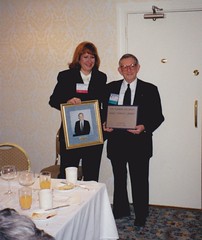

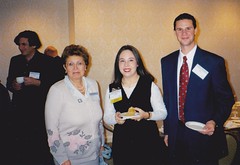

Memories from Barbara Wheeler
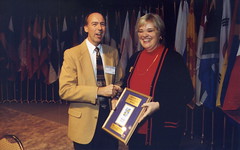
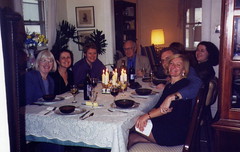

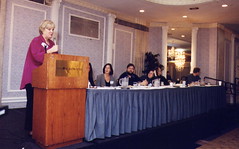
- The symposium sponsored by the Commission on Education and Training that preceded the conference was important to me and, I think, to the development of music therapy education around the world. Denise Erdonmez Grocke had invited me to attend the symposium that her commission was sponsoring. I believe she asked me because of my experience as an educator and so that I could help with the record keeping; perhaps she also had in mind that I might take a larger role in the work of that commission. This meeting resulted in Guidelines for Education and Training, intended to guide music therapy educators around the world. Denise Grocke also talks about them in her memories as President of the WFMT, and they are posted as part of this interview series—see Symposium on Education and Training. Denise and I published information about the Symposium in Music Therapy Perspectives (Wheeler, B. L., & Grocke, D. E. (2001). Report of the World Federation of Music Therapy Commission on Education, Training, and Accreditation Symposium. Music Therapy Perspectives, 19, 63-67.) After this experience, I was appointed Chair of the Commission on Education and Training and enjoyed the next years of my involvement in WFMT through this Commission and membership on the WFMT Council.
- My meeting with Dean Herbert Koerselman from the University of Louisville. I had decided to leave my job at Montclair State University in NJ after 25 years and was exploring possibilities for a new job. Dean Koerselman from the University of Louisville had come to the World Congress specifically to meet with people who might be interested in the position and to tell them about the University of Louisville. We had a very nice meeting. I was impressed with him and guess that he was impressed with me, because I later interviewed for the position as Director of Music Therapy and went to the University of Louisville, where I taught for the next 11 years. I am grateful for this positive meeting with Dean Koerselman as well as for my 11 great years in Louisville!
- I received the Research and Publication award from the American Music Therapy Association. This award recognizes a member who has achieved in this area, and I was very grateful to receive it. I am including a picture of President David Smith giving me the award. Thanks to Marilyn Sandness for nominating me for the award.
- Thanksgiving was a big celebration at my house in 1999. Because so many colleagues were in the U.S. at the time of this important American celebration, and because I lived fairly close to Washington, DC, and very near to New York City, where many of them were visiting, I invited a number of friends and colleagues to my house to celebrate Thanksgiving. We had a great time!! I have two pictures from Thanksgiving. In one or the other, you will see Wendy Magee from the UK, Wendy’s friend Maria Devereaux, Johannes Eschen from Vienna (previously from Germany), his friend Rotraut Froelich, Jane Edwards from Australia and Ireland, Daphne Rickson from New Zealand, and Suzanne Hanser and her soon-to-be husband Alan Teperow from Boston. We included a kosher Thanksgiving meal because of Alan and Suzanne—the one and only time that I have done this. We had a great time, and it was a memorable Thanksgiving!
- I was involved in four presentations in addition to the Symposium on Education and Training. Although I do remember these, I did not associate them with this conference until I saw them on my CV. They were:
- Music Therapy in Brain Injury Rehabilitation: A Pilot Study. (coauthor and presenter)
- Music Therapy Qualitative Research: How Music Therapy Research Can Influence Social Change. (panel member)
- Applying Professional Competencies to Music Therapy Education, Training, and Practice. (panel member)
- Five International Models: Panel on Applications with Nonverbal Clients. (moderator)
Memories from Nadine Wobus
I was a member of the local planning committee, so my memories of this World Congress date back to more than a year before the World Congress took place. I was Co-Chair of the Entertainment Committee (with Sean Lane), which planned and ran the Cabaret and also planned the Lunchtime Concerts. I was also AMTA’s Accessibility Consultant. We had a lot of professionals from DC, Maryland, and Virginia on the planning committee and a lot of students volunteered many hours during the World Congress to make sure everyone had the instruments, AV, and other equipment they needed for their sessions and other events. There was some frustration because the hotel was under construction, but there was so much enthusiasm as we worked together, and so much excitement during the World Congress. It was wonderful getting to know music therapists and other professionals from all over the world. I loved hearing all the different kinds of music. The performers were all wonderful. Of course, Sweet Honey in the Rock were fabulous and Stanley Jordan was amazing, but I was also so excited by Mike Rohrbacher’s students from Shenandoah with their wonderful instruments and costumes. I will probably never get to Bali, but I was transported through the music. I was so exhausted by the end of the Congress, but inspired as well. I shall treasure the memories as long as I live.
Memories from Alpha Woodward - see above
Memories from Thomas Wosch
It was an amazing conference for me. It was my first World Conference abroad. I remember even some details, i.e. the flight to Washington. We had to stop in Zurich in Switzerland and had to wait hours, because of they had to free the airplane from ice. Then in Washington D.C. we sit outside for lunch with sun glasses.But step by step: year 1999. I just started after ten years of clinical practice a position as senior lecturer of music therapy at the University of Applied Sciences of Magdeburg in Germany. We just started the first year of music therapy students over there and I was mainly shaped before by and of course educated with German music therapy. In the end of the day Washington 1999 was my first step into the international world of music therapy with consequences. Exciting for this were the five big approaches of music therapy, which were the red threat of this World Conference. From the very beginning, I could see and hear and experience Robbins, Madsen, Bonny, Benenzon and the two persons presenting Priestley Eschen and Scheiby. I was like a sponge absorbing all this. It is until today deep in my memory with lots of very detailed moments and words. But the most exciting was, that I came into contact in this conference and started to make friends with Tony Wigram. That time he was the president oft the World Federation of Music Therapy. I remember very good his statements and requirements to music therapy in the opening session of the world conference, the honour he gave to he five big approaches of music therapy presenting. I remember the normal way of having over there in the big papers everytime deaf-sign-language translators (my first conference with this), seeing Ruth Bright, exchange with lots of colleagues from all over the world, also from Germany, buying a case full of books for our also just started library, taking with us i.e. all JMT on CDs, learning about MT-BC, etc. etc. All this was very stimulating and encouraging and enriching. We invited over there international guest professors to our University. We had these talks i.e. with Clive Robbins and Tony Wigram. However, some was also very familiar to experience. One example was a presentation of clinical practice in a nursing home in US. This was focused in challenges, which are connected with this work of a music therapist. I did know all these challenges and problems and felt in a way home and surprised, that some things you can find all over the world or in minimum even intercontinental. We were so busy in this conference, that we did see Washington D.C. only on the way from the airport to the hotel and back. Inbetween we were making our very intensive experiences in worldwide music therapy in the "biggest conference of the universe." The amount of papers was really impressive and also the about 1000 participants could not make it possible, to meet all of them.
In the end for me personally this World Conference opened the door to the worldwide music therapy, of course with special experiences of US music therapy. It was a great touch with the worldwide history of modern music therapy with the five pioneers of music therapy. In this conference also started friendships and working together in such a fruitfull way, which growed without end. When I came back to Germany colleagues and students said, that they saw a change in me and I remember espescially my big enthusiasm and glimmering eyes coming back with all the experiences and future perspectives of music therapy from this conference.

